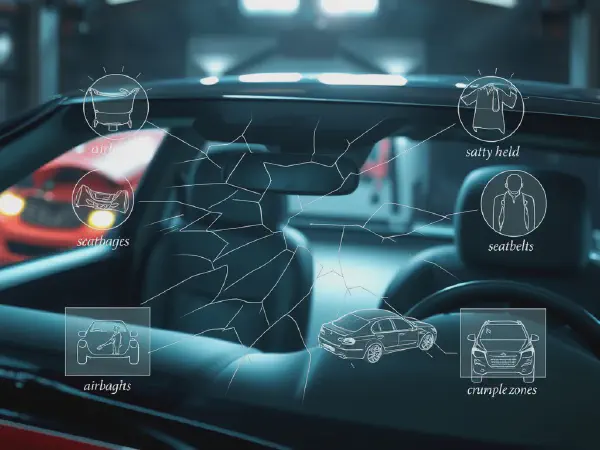Understanding How Windshield Integrity Affects Vehicle Safety

Windshield Integrity and Vehicle Safety
Windshield integrity plays a crucial role in vehicle safety, ensuring that drivers and passengers are protected during their travels. A properly functioning windshield not only provides necessary visibility but also contributes to the overall structural integrity of the vehicle. Inadequate maintenance of windshield integrity can lead to severe safety risks and potential accidents on the road.
Understanding the importance of windshield integrity and vehicle safety is essential for all car owners. Windshields are designed to withstand a variety of forces, including impacts from debris and environmental changes. They are also engineered to support the vehicle's roof during a rollover accident, which highlights the significant role they play in maintaining the safety of all occupants. Neglecting windshield integrity can severely compromise the protection a vehicle offers.
Moreover, the relationship between windshield integrity and vehicle safety extends to how effectively the driver can observe their surroundings. A damaged or compromised windshield can obscure vision, making driving hazards harder to detect. Ensuring that your windshield is free from cracks, chips, and other damages is vital not just for compliance with regulations but also for the safety of everyone in the vehicle.
Drivers should also be aware of the common causes of windshield damage, which range from environmental factors to everyday wear and tear. Regular inspection and maintenance can help prevent issues that may jeopardize windshield integrity and, by extension, vehicle safety. By staying informed, vehicle owners can take proactive measures to secure their windshields and protect their lives.
In conclusion, windshield integrity is imperative for vehicle safety, combining visibility, structural support, and protection against environmental and man-made hazards. Prioritizing windshield maintenance and repair can prevent accidents, ensure compliance with safety regulations, and promote safer roads for all.
Importance of Windshield Integrity
The importance of windshield integrity cannot be overstated given its role in maintaining vehicle safety. A windshield not only serves as a barrier against wind, rain, and debris but also offers vital structural support in the event of a collision. It is designed to remain intact and in place during a crash, thus protecting passengers from injury.
Ensuring the highest standards of Structural Integrity is crucial for the safety and performance of modern vehicles.
Another critical aspect of windshield integrity is its impact on visibility and driving conditions. A clear, undamaged windshield allows for better sightlines, improving the driver's ability to navigate and respond to road conditions. Any cracks or chips can distort vision, leading to potential hazards when driving at high speeds or in low-light conditions.
Windshield integrity is also closely connected to the car's overall structural integrity during collisions. In a rollover accident, for instance, the windshield helps prevent the roof from collapsing, which can lead to severe injuries or fatalities. An intact windshield plays a critical role in maintaining the safety cage of the vehicle that protects occupants during such incidents.
Common Causes of Windshield Damage
Several common causes can lead to compromised windshield integrity. Environmental factors such as extreme temperatures, hail, or debris from the road can impact a windshield's surface, leading to cracks or chips. Regular exposure to elements can also weaken the glass over time.
Accidents are another primary cause of windshield damage. Collisions, even minor fender benders, can create stress points in the glass or result in significant shattering. Subsequently, it is crucial to assess windshield integrity after any form of accident, no matter how trivial it may seem.
Lastly, the daily wear and tear from driving can contribute to windshield deterioration. From frequent travel on rough roads to the inevitable accumulation of dirt and grime, these factors can lead to small but significant damages that can worsen if not addressed promptly.
Signs of Compromised Windshield Integrity
Identifying signs of compromised windshield integrity is essential for maintaining vehicle safety. Drivers should look for visible cracks or chips on the surface of the glass. Even small imperfections can affect the durability of the windshield and should not be ignored.
Additionally, damaged glass can have serious effects on safety. A compromised windshield can lead to reduced visibility, particularly when encountering adverse weather conditions such as rain or snow. Furthermore, any significant braking or turning could make it more likely for the glass to shatter.
When signs of damage are evident, seeking professional inspection is crucial. Technicians can assess the situation accurately and determine whether repair or replacement is necessary to ensure the vehicle's safety. Ignoring these signs can lead to worse problems later on, and potentially endanger lives.
Repair vs. Replacement of Windshields
When addressing windshield damage, drivers often face the decision of whether to repair or replace their windshields. Various factors determine the repairability of windshields, including the location, size, and type of damage. For instance, small chips outside of the driver’s line of sight may be repairable, while larger cracks generally necessitate replacement.
There are several benefits to timely windshield replacement. A new windshield will restore the structural integrity and safety of the vehicle, ensuring that all safety features, including airbags, function correctly during a collision. Moreover, replacing rather than delaying repairs helps prevent damage from worsening, which can save money in the long run.
Costs associated with windshield repair and replacement vary based on factors such as vehicle make, model, and the damage extent. However, prioritizing this repair is crucial for accounting for potential safety risks and the overall longevity of the vehicle.
Regulations and Standards for Windshield Safety
Regulations and standards for windshield safety dictate how manufacturers design and produce windshields. Organizations such as the National Highway Traffic Safety Administration (NHTSA) set safety standards to ensure that windshields can withstand impacts and provide adequate protection for passengers.
Legal requirements for windshield integrity vary by region but generally mandate that any vehicles on the road must have functional and unblemished windshields. Failure to comply can lead to traffic violations and safety threats.
Impact of regulations on vehicle manufacturers includes the obligation to incorporate safety features into the windshield design. Compliance with these regulations not only protects passengers but also ensures that manufacturers remain accountable for the quality and integrity of the glass they produce.
Impact of Windshield Integrity on Airbag Performance
Windshield integrity is also vital to the effective performance of airbags. The windshield must be properly secured for an airbag to deploy correctly during a collision. If a windshield is damaged or improperly installed, it can impact the deployment timing and effectiveness of the airbag, presenting a significant safety risk.
Moreover, compromised airflow through a damaged windshield can hinder airbags from inflating properly. Airbags deploy rapidly; thus, any obstruction can affect their functionality, elevating the risk of severe injury during a crash.
Therefore, continuous safety testing for windshields and airbags is essential to ensure that vehicles meet the required safety standards. This testing helps identify any flaws or potential breakdowns, contributing to safer vehicles on the road.
